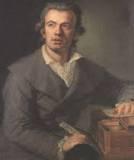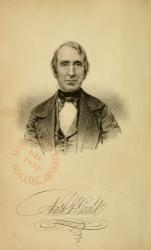Planning worship?
Check out our sister site, ZeteoSearch.org,
for 20+ additional resources related to your search.
- |
User Links
Person Results
Frederick C. Maker
1844 - 1927 Person Name: F. C. Maker (1844- ) Composer of "ELTON" in Hymns of Worship and Service Frederick C. Maker (b. Bristol, England, August 6, 1844; d. January 1, 1927) received his early musical training as a chorister at Bristol Cathedral, England. He pursued a career as organist and choirmaster—most of it spent in Methodist and Congregational churches in Bristol. His longest tenure was at Redland Park Congregational Church, where he was organist from 1882-1910. Maker also conducted the Bristol Free Church Choir Association and was a long-time visiting professor of music at Clifton College. He wrote hymn tunes, anthems, and a cantata, Moses in the Bulrushes.
Bert Polman
Frederick C. Maker
William B. Tappan

1794 - 1849 Person Name: William Bingham Tappan Author of "There is an hour of peaceful rest" in Hymns and Tunes See also in:
Hymn Writers of the Church
=============================
Tappan, William Bingham, was born at Beverley, Massachusetts, Oct. 29, 1794, and was apprenticed to a clockmaker at Boston in 1810. In 1815 he removed to Philadelphia, where he was engaged in business for a time. In 1822 he was engaged as Superintendent of the American Sunday School Union. In 1840 he was licensed to preach with the Congregational body, his sphere of usefulness on behalf of Sunday Schools being thereby considerably widened. He died suddenly, of cholera, at West Needham, Massachusetts, June 18,1849. His poetical works include:— (1) New England and Other Poems, 1819; (2) Poems, 1822; (3) Lyrics, 1822; (4) Poetry of the Heart, 1845; (5) Sacred and Miscellaneous Poems, 1848; (6) Poetry of Life, 1848; (7) The Sunday School and Other Poems, 1848; (8) Late and Early Poems, 1849; (9) Sacred Poems, 1849; (10) Gems of Sacred Poetry, 1860.
Of these works the earliest are the most-important. His hymns in common use include the following:—
1. Holy be this as was the place. Public Worship. Included in his Lyrics, 1822; and given in Lyra Sacra Americana, 1868.
2. The ransomed spirit to her home. Love. Appeared in Nettleton's Village Hymns, 1824. This is probably his best hymn.
3. There is an hour of hallowed peace. Heaven, a Place of Rest. Given in his New England and Other Poems, 1819.
4. There is an hour of peaceful rest. Heaven a Place of Rest. The author's account of this hymn in his Gems of Sacred Poetry, 1860, is that it "was written by me, in Philadelphia, in the summer of 1818, for the Franklin Gazette, edited by Richard Bache, Esq., and was introduced by him to the public in terms sufficiently flattering to a young man who then certainly lacked confidence in himself. The piece was republished in England and on the Continent, in various newspapers and magazines, and was also extensively circulated in my own native land, where it has found a place in several hymn and music-books. It was published in my first volume of Poems, at Philadelphia, in 1819, and soon after was set to music by A. P. Heinrich, Esq., in the same city." It is in Lyra Sacra Americana, 1868, p. 265.
5. 'Tis midnight, and on Olive's brow. Gethsemane. Appeared in his Poems, 1822, and repeated in Lyra Sacra Americana, 1868, and several hymnals.
6. Wake, isles of the south, your redemption is near. Missions. Appeared in the Lyrics, 1822. It was sung at the wharf in New Haven at the embarkation of Missionaries for the Sandwich Islands, 1822.
7. When sorrow casts its shades around us. Resignation. From his New England and Other Poems, 1819. It is in Lyra Sacra Americana, 1868.
8. While the solemn note of time. Saturday Evening. Published in his Poems, 1822; repeated in Lyra Sacra Americana, 1868, and thence into Thring's Collection, 1882. [Rev F. M. Bird, M.A.]
--John Julian, Dictionary of Hymnology (1907)
William B. Tappan
Anonymous
Person Name: Anon. Author of "There is an hour of peaceful rest" in The Seventh-Day Adventist Hymn and Tune Book In some hymnals, the editors noted that a hymn's author is unknown to them, and so this artificial "person" entry is used to reflect that fact. Obviously, the hymns attributed to "Author Unknown" "Unknown" or "Anonymous" could have been written by many people over a span of many centuries.
Anonymous
Joseph Barnby

1838 - 1896 Person Name: J. Barnby Composer of "PEACEFUL REST" in Church Hymns and Tunes Joseph Barnby (b. York, England, 1838; d. London, England, 1896) An accomplished and popular choral director in England, Barby showed his musical genius early: he was an organist and choirmaster at the age of twelve. He became organist at St. Andrews, Wells Street, London, where he developed an outstanding choral program (at times nicknamed "the Sunday Opera"). Barnby introduced annual performances of J. S. Bach's St. John Passion in St. Anne's, Soho, and directed the first performance in an English church of the St. Matthew Passion. He was also active in regional music festivals, conducted the Royal Choral Society, and composed and edited music (mainly for Novello and Company). In 1892 he was knighted by Queen Victoria. His compositions include many anthems and service music for the Anglican liturgy, as well as 246 hymn tunes (published posthumously in 1897). He edited four hymnals, including The Hymnary (1872) and The Congregational Sunday School Hymnal (1891), and coedited The Cathedral Psalter (1873).
Bert Polman
Joseph Barnby
George Kingsley
1811 - 1884 Composer of "TAPPAN" in Evangelical Lutheran hymnal Born: July 7, 1811, Northampton, Massachusetts.
Died: March 14, 1884, Northampton, Massachusetts.
Kingsley played the organ at the Old South Church and Hollis Street Church in Boston, Massachusetts. He also taught music at Girard College in Philadelphia, Pennsylvania, served as music supervisor for public schools in Philadelphia, and compiled a number of music books, including:
Sunday School Singing Book, 1832
The Harmonist, 1833
The Social Choir, 1836
The Sacred Choir, 1838
The Harp of David, 1844
The Young Ladies’ Harp, 1847
Templi Carmina (Northampton, Massachusetts: 1853)
The Juvenile Choir, 1865
--www.hymntime.com/tch
George Kingsley
Johann G. Naumann

1741 - 1801 Person Name: J. A. Naumann Composer of "[There is an hour of peaceful rest]" in Carmina Sacra Johann Gottlieb Naumann; b. near Dresden, 1741; d. Dresden, 1801
Evangelical Lutheran Hymnal, 1908
==========================
Born: April 7, 1741, Blasewitz, Dresden, Germany.
Died: October 23, 1801, Dresden, Germany.
Buried: Eliasfriedhof, Dresden, Germany.
Naumann received his musical training in his town school, where he learned piano and organ. Later, he studied at the Kreuzschule in Dresden and was a member of the Dresden Kreuzchor. In Dresden, he learned from the organist and cantor of the Kreuzschule, Gottfried August Homilius, a student of Bach. In May 1757, he traveled to Italy with Swedish violinist Anders Wesström. Composer Giuseppe Tartini encountered Naumann in 1762 and took an interest in his work. Later that year, Naumann made his debut as an opera composer in Venice with Il Tesoro Insidiato. After his successful 1764 production of Li Creduti Spiriti, he was engaged as the second church composer at the Dresden court, on the recommendation of composer Johann Adolf Hasse.
In 1777, as a result of negotiations by Swedish diplomat Count Löwenhjelm, Naumann was appointed to reform the Stockholm Hovkapell and help King Gustavus III in his opera plans. His work in Sweden led to the 1782 production of his opera Cora och Alonzo at the inauguration of the new opera house in Stockholm, and the 1786 production of Gustaf Wasa, based on an idea of the king for a Royal Swedish Opera. After a period as guest composer in Copenhagen (1785-56), he returned to Dresden, where he became Oberkapellmeister.
In 1792, Naumann married Catarina von Grodtschilling, daughter of a Danish vice-admiral. His grandson was composer Ernst Naumann (1832–1910).
http://www.hymntime.com/tch/bio/n/a/u/naumann_jg.htm
==============================
http://en.wikipedia.org/wiki/Johann_Gottlieb_Naumann
Johann G. Naumann
Nathaniel D. Gould

1781 - 1864 Person Name: Nathaniel Duren Gould Composer of "WOODLAND" in The Cyber Hymnal Nathaniel Duren Gould 1781-1864. Born in Bedford, MA, into the Duren family, He was musically inclined and attended a singing school when young. He was also a master and teacher of penmanship and engraving. As a conservative music reformer he opened a singing school in 1799. He taught mostly Psalmody singing. He married Sally Andrews Prichard in 1801, and they had eight children: Nathaniel, Augustus, Charles, Mary Ann, (2 unnamed infants that died), Elizabeth and Sarah. He also formed the New Ipswitch military band in 1804 He was conductor of the Middlesex MA Musical Society in 1805. He took the name Gould in 1806 to qualify for an inheritance from an uncle. He taught music in NH and MA in some 115 singing schools over 50+ years and had more than 50,000 students. He also compiled and published music. He authored a number of books, one being “History of church music in America” (1853) about early singing schools. He noted traits and temperaments of many singers, some not really performing for the glory of God. He died in Boston, MA.
John Perry
Nathaniel D. Gould
Henry L. Morley
Person Name: H. L. Morley Composer of "NEWCASTLE" in Church Hymns and Tunes
Henry L. Morley
H. H. Petersen
1835 - 1909 Person Name: Hans Henry Petersen, 1835–1909 Author of "Secret Prayer" in Hymns of the Church of Jesus Christ of Latter-day Saints An early Danish Mormon (baptized into the LDS church in 1853); emigrated to Utah 1862. Organized a Scandinavian choir in Salt Lake City. Moved to Hyrum, Utah, in 1868 and was active in local government as well as in the church, serving as choir director to the Hyrum stake.
--based on the Wikipedia article, much condensed
H. H. Petersen
D. H. Mansfield
Person Name: D. H. M. Composer of "THERE IS AN HOUR OF PEACEFUL REST" in The American Vocalist
D. H. Mansfield


 My Starred Hymns
My Starred Hymns


